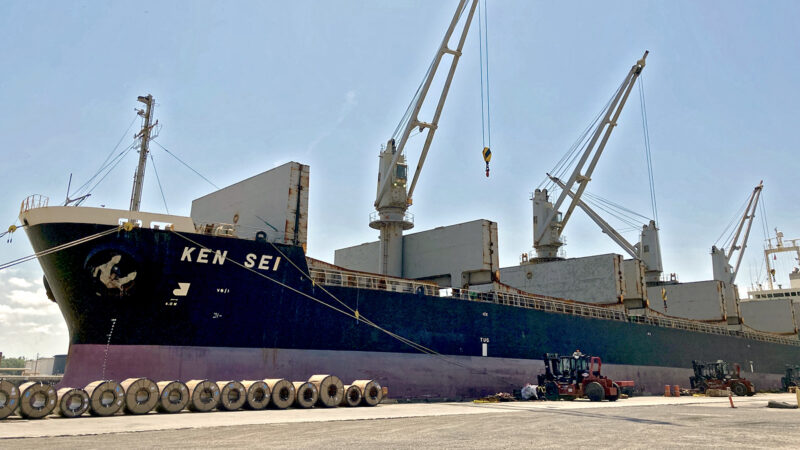Supply chain issues in California open up a business opportunity for Gulf Coast ports
All the cargo ships stuck waiting off the California coast begs a simple question: Why not sail to the Gulf Coast instead?
Politicians and southern port officials have been making just that call. Former Alabama House of Representatives member Paul DeMarco said the Port of Mobile can help solve the nation’s supply chain problems in a recent op-ed. The Port of New Orleans is also making its pitch to shipping companies during conferences and over social media.
Chief Commercial Officer Todd Rives shared with @WWLTV last week about Port NOLA’s growing breakbulk volumes and willingness to support the supply chain as we see national impacts. See the whole interview here:https://t.co/GZqUz8Z7UU #connectinglousianawiththeworld
— Port of New Orleans (@PortNOLA) November 15, 2021
So far, plenty of companies have listened. The Port of Mobile’s container volume went up 27% in September compared to the same time last year. The port credits at least part of that boost to more vessels coming from Asia. The Port of South Louisiana also saw growth, with 47% more tons of goods coming through during the second quarter of 2021. Experts say sea traffic shifting to these ports helps alleviate the supply chain’s problems.
But while some ships decided to dock in the South, plenty of others still wait in line off the California coast. That’s because problems like truck driver and shipping container shortages can’t be solved by changing ports.
“Some of the problems plaguing the West Coast ports, they’re not gonna just go away just because you shift from one area of the country to another,” said Chris Connor, American Association of Port Authorities president.
Even with the wait, it can actually be cheaper to stick with California. Companies have invested a lot more there in warehouses, rail lines, and other ground infrastructure, which experts say is where the real savings come from.
Ground transportation matters enough that some ships have long chosen to sail from Asia past the Gulf Coast to New York.
“Sometimes it’s cheaper than if you unload the stuff in California,” said Zikai Zhou, assistant professor at the University of Southern Mississippi. “Even if it looks like it’s a longer distance.”
Gulf Coast ports also deal more with exports than imports. And they certainly don’t deal with nearly the same volume as places like Long Beach, which handles more than 40% of the nation’s containerized imports.
Jay Chen, an associate professor with Cleveland State University, said scaling up southern ports isn’t a simple task, comparing it to modifying a Honda Civic for trucking.
“You cannot change a compact car to haul big trailers,” Chen said. “It’s just by design very, very different.”
But the shipping logjam in the Pacific shows that relying on just a few ports is not a good idea either — a handy argument for Gulf Coast officials as they compete for funding from the $17 billion set aside for ports in the recently passed federal infrastructure plan.
It would be too late to make much of a difference this time with this shipping crisis, but the money could go toward upgrading southern ports to better lend a hand the next time the supply chain gets knotted.
This story was produced by the Gulf States Newsroom, a collaboration between Mississippi Public Broadcasting, WBHM in Birmingham, Alabama, WWNO in New Orleans and NPR.
Birmingham is 3rd worst in the Southeast for ozone pollution, new report says
The American Lung Association's "State of the Air" report shows some metro areas in the Gulf States continue to have poor air quality.
Why haven’t Kansas and Alabama — among other holdouts — expanded access to Medicaid?
Only 10 states have not joined the federal program that expands Medicaid to people who are still in the "coverage gap" for health care
Once praised, settlement to help sickened BP oil spill workers leaves most with nearly nothing
Thousands of ordinary people who helped clean up after the 2010 BP oil spill in the Gulf of Mexico say they got sick. A court settlement was supposed to help compensate them, but it hasn’t turned out as expected.
Q&A: How harm reduction can help mitigate the opioid crisis
Maia Szalavitz discusses harm reduction's effectiveness against drug addiction, how punitive policies can hurt people who need pain medication and more.
The Gulf States Newsroom is hiring a Community Engagement Producer
The Gulf States Newsroom is seeking a curious, creative and collaborative professional to work with our regional team to build up engaged journalism efforts.
Gambling bills face uncertain future in the Alabama legislature
This year looked to be different for lottery and gambling legislation, which has fallen short for years in the Alabama legislature. But this week, with only a handful of meeting days left, competing House and Senate proposals were sent to a conference committee to work out differences.








